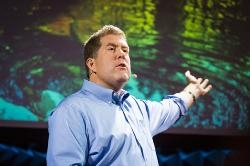When Chad Orzel applied for a chance to speak at TED@NYC, a talent search of sorts for the main TED conference that brings together some of the world’s top thinkers and doers, he didn’t expect much.
An associate professor of physics and chair of the Department of Physics and Astronomy, Orzel submitted a one-minute video that served as an elevator pitch for his next book, How to Think Like a Scientist.
The book, out late next year, aims to make science less mysterious and intimidating by showing that many of the things non-scientists do for fun and relaxation make use of the same mental processes that scientists use when making major discoveries.
The author of two books, How to Teach Physics to Your Dog and How to Teach Relativity to Your Dog, Orzel thought, if nothing else, the clip was a worthwhile exercise to summarize the argument of his book-in-progress.
Organizers apparently liked what they saw.
Last week, Orzel shared a stage in Manhattan with 27 other invitees hoping for a spot on the main stage in Vancouver in March, where speakers are “challenged to give the talk of their lives.”
Adapting a chapter from the upcoming book, Orzel gave a six-minute talk on how the historical process of discovering quantum physics can be compared to working a crossword puzzle.
“The idea is that as bizarre as the notion of electrons behaving like waves may seem, physicists were led to it by a process that's very familiar: they pieced clues together in the same way that people working a crossword puzzle do,” he said.
He shared five important steps in the process used by scientists like Albert Einstein, Ernest Rutherford and Niels Bohr. They looked at experimental evidence and introduced new ideas that both explained the particular phenomenon they were looking at and fit together with the ideas of others to make a coherent whole. This, in turn, led to the notion of electrons behaving like waves (introduced by Louis de Broglie), which, Orzel explained, “is both bizarre and inevitable, given all the other results.
“If people can learn to see science as a familiar process, something they use every day, then I hope they can have a greater appreciation and understanding of science and its products,” he said.
The six-minute limit for speakers presented challenges. Orzel said his shortest presentations were 10 to 12 minutes, but he hasn’t given a formal presentation shorter than a half hour in years. But event organizers helped speakers polish their talks and provided useful feedback, an important lesson for students, Orzel said, “that no matter how long you do something you never stop needing to rehearse.”
Orzel admits he faces tough competition to get to Vancouver. He was impressed by a number of speakers, including Sally Kohn, who talked about what she’s learned as a progressive lesbian commentator for Fox News; Christopher Emdin, who discussed what educators can learn from hip-hop artists and black churches; and Zak Ebrahim, who was raised by a father who became a violent extremist, assassinating Rabbi Meir Kahane. He was also one of the 1993 World Trade Center bombers.
For more on the event, click here.
Orzel and the others must now wait to see if their talks (which were professionally filmed) get featured on Ted.com and which speakers made the grade for Vancouver.
Regardless, Orzel said he enjoyed the experience.
“I’m flattered that organizers thought my science-is-cool shtick was on the same level as the stuff some of the other speakers have done,” Orzel said. “It was an amazing program full of extremely smart and accomplished people, and I'm deeply honored to have been included in such distinguished company.”
